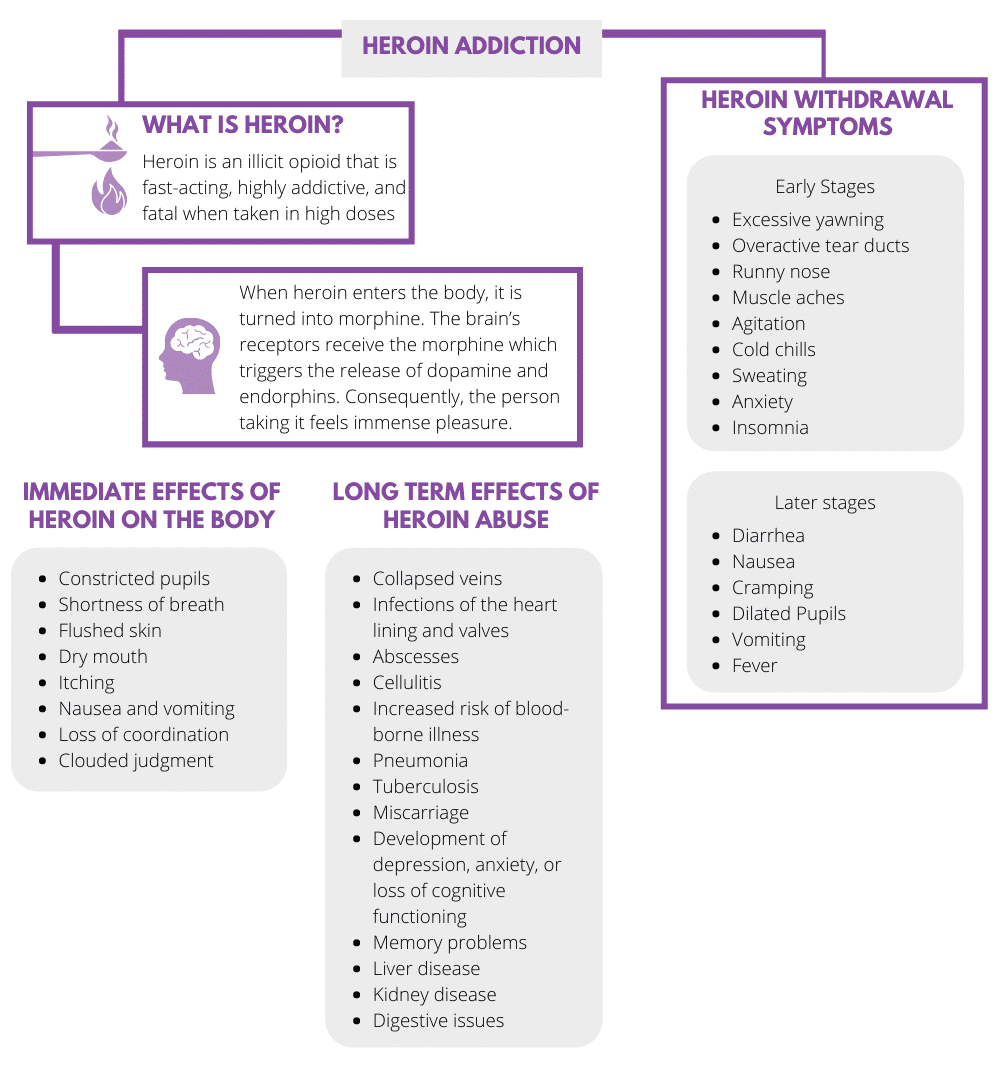Heroin is an illicit opioid that is fast-acting, highly addictive, and fatal when taken in high doses. Approximately 15,000 people died from a heroin overdose in the U.S.in 2017.[1] Heroin is derived from the poppy plant, found in Mexico, Asia, and South America. Its appearance varies depending on how it is manufactured, but its most common forms are black tar, a sticky brown or black substance, and a powder that is white or brown in color. Heroin can be smoked, snorted, or injected.
Regardless of the method of administration, heroin acts on the brain rapidly. Almost instantly, it causes a rush of euphoria and relaxation. In addition, the effects are long-lasting and can continue for several hours. Users may think slowly, walk slowly, and even nod out – as if they are falling asleep. Although most people know that heroin is highly addictive, people still use it to achieve the high it produces. Sometimes, a person can become addicted after just a few doses.
If you or a loved one is abusing heroin, it is important to know the signs and symptoms of addiction as well as heroin withdrawal symptoms. In most cases, people suffering from heroin addiction cannot quit without professional help from a drug rehab center.
Table of Contents
ToggleImmediate Effects of Heroin on the Body
When a person uses heroin, there are many side effects that he or she will experience. In addition to a strong feeling of euphoria, a person may become extremely drowsy or tired. He or she may appear to be falling asleep or “nodding out”. If a person is under the influence of heroin, you may notice the following:
- Constricted pupils
- Shortness of breath
- Flushed skin
- Dry mouth
- Itching
- Nausea and vomiting
- Loss of coordination
- Clouded judgment
When heroin enters the body, it is turned into morphine. The brain’s receptors receive the morphine which triggers the release of dopamine and endorphins. Consequently, the person taking it feels immense pleasure. However, this feeling can be highly addictive, causing many people to chase that sensation endlessly.
Long Term Effects of Heroin Abuse
Long term heroin abuse can have devastating effects on the mind and body. First, long-term heroin abuse typically indicates that a person has an opioid use disorder – a compulsive, habitual pattern of drug abuse. Other long term effects of heroin abuse include:[2]
- Collapsed veins
- Infections of the heart lining and valves
- Abscesses
- Cellulitis
- Increased risk of blood-borne illness (i.e. HIV, AIDS, Hepatitis B, and Hepatitis C)
- Pneumonia
- Tuberculosis
- Miscarriage
- Development of depression, anxiety, or loss of cognitive functioning
- Memory problems
- Liver disease
- Kidney disease
- Digestive issues
Overall, long term heroin abuse negatively affects breathing, heart rhythms, and blood pressure – all of which are vital bodily functions. In addition, heroin is often cut with many unknown substances and potentially dangerous chemicals. Consequently, these chemicals can further damage the body’s essential organs.
Heroin Withdrawal Symptoms
Heroin is both mentally and physically addictive. Therefore, when a person stops taking it, the body and mind begin to experience unpleasant and dangerous withdrawal symptoms. After all, the body needs time to recover and adjust to functioning without heroin. Heroin withdrawal symptoms can begin just hours after a user’s last dose and can last for several days. In addition, some less severe symptoms can linger for more than a week. [3]
Early heroin withdrawal symptoms include:
- Excessive yawning
- Overactive tear ducts
- Runny nose
- Muscle aches
- Agitation
- Cold chills
- Sweating
- Anxiety
- Insomnia
Symptoms that occur in the later stages of heroin withdrawal are:
- Diarrhea
- Nausea
- Cramping
- Dilated pupils
- Vomiting
- Fever
Symptoms of heroin withdrawal mimic a severe case of the flu. While these symptoms are typically not fatal, they can lead to severe dehydration and greater problems if not treated. In addition, the mental craving for heroin may become so strong that a person uses and is unable to detox on his or her own. As a result, the best way to manage heroin withdrawal symptoms is to obtain help from a medical detox. At detox, individuals will be monitored and given medications to help mitigate their symptoms.

Signs and Symptoms of Heroin Addiction
When people continue to use heroin, they will develop a tolerance to the drug. Their bodies will demand more and more of the drug to produce the desired effects. As tolerance builds, physical dependency builds as well. Then, the body experiences more severe withdrawal symptoms as time goes on. Tolerance and withdrawal symptoms are two factors that indicate a heroin addiction. However, there are other signs you can look for as well, such as:
- Inability to stop using even when a person wants to
- Neglecting personal, work, social, and financial responsibilities
- Track marks on arms
- Rapid weight loss
- Withdrawing from family and friends
- Continuing to use despite of negative consequences
- Unusual mood swings and behavioral changes
- Increasing engagement in risky or illegal behaviors
- Lying to friends and family about drug use
Heroin addiction can affect a person’s behavior, stress response, and decision-making abilities. Many people who are addicted to heroin find it impossible to stop without professional help.
If you or a loved one is suffering from heroin addiction, reach out for help today. Heroin is deadly, so the sooner you get help, the better. Don’t wait another day – contact the addiction specialists in Fort Lauderdale today.
References:
- https://www.cdc.gov/drugoverdose/data/heroin.html
- https://www.webmd.com/mental-health/addiction/heroin-use#2
- https://www.verywellmind.com/what-to-expect-from-heroin-withdrawal-22049







